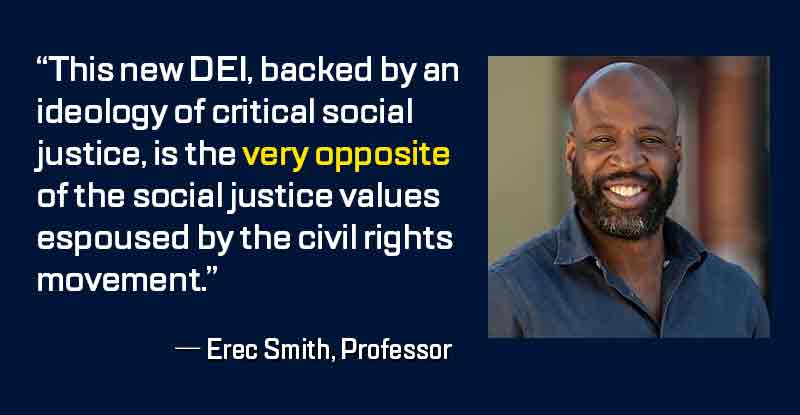By Erec Smith
The historic Supreme Court ruling to end affirmative action in college admissions was one of the biggest events of 2023, but few acknowledged the ruling’s inapplicability to military academies and, by extension, military recruitment strategies.
Unlike public civilian institutions, military academies still face scrutiny for imposing quotas and skirting merit as a primary factor in admissions and recruiting.
But affirmative action is only part of the problem.
As with other institutions, DEI—Diversity, Equity, and Inclusion—is a volatile point of contention in the military. In fact, prominent figures in and around the military insist that DEI threatens national security.
The issue is bigger than unequal admissions and recruitment.
DEI writ large is eroding the integrity of the U.S. Armed Forces from the inside out.
Before I go any further, I need to clarify that I am not against diversity, equity, or inclusion in their original meanings.
As a black man whose father has shared stories about racism in the Army during his 22 years of service (including two tours in Vietnam), I would like nothing more than to improve race relations in the military.
But the words “diversity,” “equity,” and “inclusion” have gone from obvious American virtues to vices in recent years, not because Americans have soured on racial equality, but because those words have taken on meanings that actually oppose their common interpretations.
This new DEI, backed by an ideology of critical social justice, is the very opposite of the social justice values espoused by the civil rights movement.
To be clear, the ideology of critical social justice is not Martin Luther King’s civil rights. King highlighted character, open-mindedness, and equality.
Sadly, the critical social justice variety of DEI (Let’s call it “CSJ-DEI”) is about the primacy of skin color, intolerance of opposing viewpoints, and the inherent inequality between white people (fundamentally considered oppressors) and non-white people (fundamentally considered oppressed).
Former King speechwriter Clarence Jones agrees, insisting this ideology “would violate everything that Martin King and I worked for.”
In fact, because of the divisive and meritless nature of CSJ-DEI, the 93-year-old has said, “I am damn sure, at this time in my life, I’m not going to turn my back. This time is more urgent than ever.”
Righting the wrongs of the past does not necessitate new wrongs in the present.
The systemically discriminatory U.S. Army of the past is gone, but contemporary DEI initiatives could do more to reintroduce differential treatment than end it for good.
CSJ-DEI is bad for everyone, especially in the military. It is notoriously divisive; but what is a national military without unity?
It demonizes the virtues a well-functioning military cannot do without: hard work, action orientation, rational thinking, discipline, etc.
Why? They are considered “aspects of whiteness.”
So where do we go from here? How can we protect our military from CSJ-DEI while still embracing traditional civil rights?
That is, how do we make sure DEI initiatives in the military are the kind that promote equality, merit, free speech, and, of course, unity?
Fortunately, members of Congress are starting to listen, and some are taking action.
Senator Eric Schmitt (R-Mo.) included an amendment in the National Defense Authorization Act to put a hiring freeze on CSJ-DEI initiatives in the military so that the Government Accountability Office can conduct an audit of federal DEI-related employees to ensure that any initiative to improve race relations is done productively.
Sen. Schmitt’s plan is simple: look and see for ourselves. “Every branch of our military has a duty to promote and exemplify cohesiveness within a unit, branch, and fighting force as a whole,” Schmitt told the Washington Examiner.
“Driving wedges between soldiers with DEI initiatives undermines the military’s main purpose: ensuring the United States remain ready to confront adversaries with overwhelming force wherever they may arise.”
Senator Schmitt is onto something. Sunlight is the best disinfectant; an audit could help determine which initiatives are or are not good for the overall functioning of the U.S. Armed Forces.
No one is against diversity, equity, and inclusion in the original senses of those terms, but it looks like contemporary DEI training flies in the face of American values like merit, unity, and, most ironically, equality.
Erec Smith is a Research Fellow at the Cato Institute and Associate Professor of Rhetoric at York College of Pennsylvania.








Leave a Comment